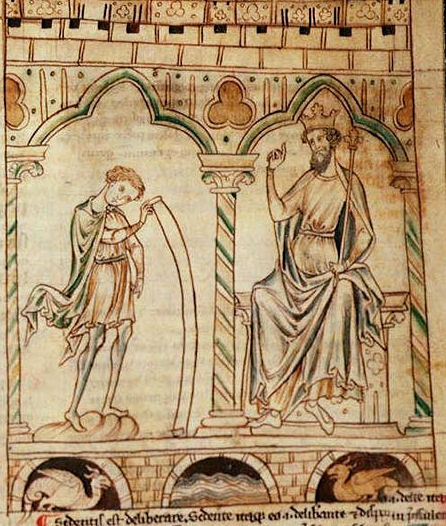|
Prophecy Of Merlin
''Prophecy of Merlin'' (''Prophetia Merlini''), sometimes called ''The Prophecy of Ambrosius Merlin concerning the Seven Kings'', is a 12th-century poem written in Latin hexameters by John of Cornwall, which he claimed was based or revived from a lost manuscript in the Cornish language. The original manuscript is unique and currently held in a codex at the Vatican Library. Synopsis The text is an example of the popular prophetic writings attributed to the sage Merlin, which ascribe to the early bard prophecies relevant to the author's time. In this case the prophecies relate to the struggle between Stephen of Blois and the Empress Matilda, but the poem also contains local Cornish allusions of great interest. History The translations were made sometime between 1141 and 1155, at the request of Robert Warelwast, Bishop of Exeter. John of Cornwall undertook to expound the prophecy of Merlin ''iuxta nostrum Britannicum''. He produced a poem of 139 hexameters and prose commentary on ... [...More Info...] [...Related Items...] OR: [Wikipedia] [Google] [Baidu] |
Latin
Latin (, or , ) is a classical language belonging to the Italic branch of the Indo-European languages. Latin was originally a dialect spoken in the lower Tiber area (then known as Latium) around present-day Rome, but through the power of the Roman Republic it became the dominant language in the Italian region and subsequently throughout the Roman Empire. Even after the fall of Western Rome, Latin remained the common language of international communication, science, scholarship and academia in Europe until well into the 18th century, when other regional vernaculars (including its own descendants, the Romance languages) supplanted it in common academic and political usage, and it eventually became a dead language in the modern linguistic definition. Latin is a highly inflected language, with three distinct genders (masculine, feminine, and neuter), six or seven noun cases (nominative, accusative, genitive, dative, ablative, and vocative), five declensions, four verb conjuga ... [...More Info...] [...Related Items...] OR: [Wikipedia] [Google] [Baidu] |
Prophetiae Merlini
The ''Prophetiæ Merlini'' is a Latin work of Geoffrey of Monmouth circulated, perhaps as a ''libellus'' or short work, from about 1130, and by 1135. Another name is ''Libellus Merlini''. The work contains a number of prophecies attributed to Merlin, the wizard of legend, whose mythical life is often regarded as created by Geoffrey himself, although Geoffrey claims to have based the figure on older Brittonic traditions, some of which may have been oral but now are lost. The ''Prophetiae'' preceded Geoffrey's larger '' Historia Regum Britanniæ'' of c. 1136, and was mostly incorporated in it, in Book VII; the prophecies, however, were influential and widely circulated in their own right. According to Geoffrey, he was prompted by Alexander of Lincoln to produce this section of his larger work separately. Background The ''Prophetiæ'' is in some ways dependent on the '' De Excidio et Conquestu Britanniæ'' of Gildas. From Gildas and Nennius Geoffrey took the figure of Ambrosius ... [...More Info...] [...Related Items...] OR: [Wikipedia] [Google] [Baidu] |
Cornish-language Literature
Cornish ( Standard Written Form: or ) , is a Southwestern Brittonic language of the Celtic language family. It is a revived language, having become extinct as a living community language in Cornwall at the end of the 18th century. However, knowledge of Cornish, including speaking ability to a certain extent, continued to be passed on within families and by individuals, and a revival began in the early 20th century. The language has a growing number of second language speakers, and a very small number of families now raise children to speak revived Cornish as a first language. Cornish is currently recognised under the European Charter for Regional or Minority Languages, and the language is often described as an important part of Cornish identity, culture and heritage. Along with Welsh and Breton, Cornish is descended from the Common Brittonic language spoken throughout much of Great Britain before the English language came to dominate. For centuries, until it was pushed westw ... [...More Info...] [...Related Items...] OR: [Wikipedia] [Google] [Baidu] |


